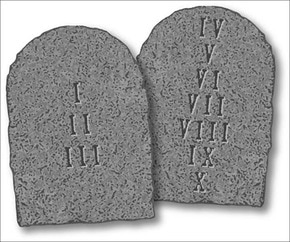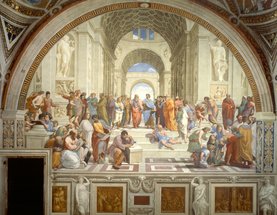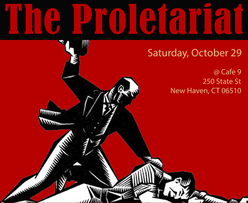|
Mad Max: Fury Road and Apocalypto are two awesome movies. Strangely connected by Mel Gibson. He was the original Mad Max and then he directed Apocalypto. One great feature of both movies is the idea of chase, and flight. In both cases, just about half the movie is chasing/fleeing at high speed. In Apocalypto, the chase is on foot through a jungle, in Mad Max it is with vehicles through a post-apocalyptic wilderness. Both feature religion in fascinating ways. In Apocalypto you get the full force of the Inca religion and then it runs smack into Catholicism, literally. There's a great scene at the end. Here it is. (Stop at the 1:35 mark or go on to the end) In Mad Max, they mix in different religious elements including, Valhalla, the Nordic after life. When the War Boys are about to die, they call out to the others, "Witness Me," and then then go out in a blaze of glory. We get the first taste of this in this following scene. In the film, one of the War Boys is captured by Furiosa and Max who are fleeing their captors. Nux is spared and he joins them and one of the women with him takes to him. The plan is, along with the few others with them, to destroy the sole path through a natural stone arch and return the community and run it differently. But of course, things go wrong and it is clear that Nux is going to die. And so in that moment, in an absolutely fantastic scene, he calls out to the others to witness him. When we think of death, there are two poles. On the one hand, we die alone. No one dies or can die with you or for you. That is the stark reality. On the other hand, we want people to share that death. But only if they want to. So only in a moment, when you are witnessed in death, is the cycle complete in a sense. Just as we're never born alone, when your death is witnessed, you don't die alone.
1 Comment
 The ten commandments are often used to sketch out the parameters for Christian morality. But they seem to me to be secondarily about morality and more a statement about God and his relation to his creation. Wikipedia has a great chart on the various numbering traditions of the ten commandments (numbering them is not as straightforward as it would seem). The medieval Christian tradition divided the commandments into two tables. The first three (or four) on the first and the rest on the second. The division makes sense on the face of it. The second table is a set of clear moral and negatively phrased moral prescriptions, "thou shalt not." These have to do with one's relations to those in one's community. The first table, on the other hand, focus on God. Then there's the fourth, which no one's quite sure where to place. Honoring father and mother would seem to be an easy fit for the second table, but there is something about honoring father and mother that seems to stand in proxy for honoring God. (First Table)
(Second Table) 4. Honor thy father and thy mother. 5. Thou shalt not kill. 6. Thou shalt not commit adultery. 7. Thou shalt not steal. 8. Thou shalt not bear false witness against thy neighbor. 9. Thou shalt not covet thy neighbor's wife 10. Thou shalt not covet thy neighbor's house, servants, animals, or anything else Now, there is one approach to the ten commandments that would say that these commandments reflect a moral goodness inherent in existence and not even God would/could contradict them. Not that he would want to but that it would be contradictory to his nature. So it is always eternally wrong to steal or to murder or to commit adultery, just as it is always eternal wrong to have another god instead of God. Another approach, represented by a medieval, John Duns Scotus, says that while the first table of the commandments reflect prescriptions that are inherent to existence, the second doesn't. So God cannot truthfully say to not worship him or to take his name in vain. However, there is a world or an arrangement of things in which God could will that adultery is acceptable (of course then, it may not be called adultery). In this case, rightness and goodness are determined by God's will as opposed to the first case where rightness and goodness are established by God's nature. With parallel worlds then, you can maintain a system of the Christian God with a moral system markedly different than we have in ours. The key would be that the first table of the law can't be violated and the other commandments have to be in harmony with them.  Inside Higher Ed has a story about U of St. Thomas in Houston which looks like it's forcing out its English and Philosophy faculty to make way for new STEM faculty. They say there's increased demand in the STEM fields and not enough demand in Humanities fields to justify the faculty distribution. The usual reason given for these moves is financial. Liberal Arts don't seem to offer value, i.e., for what a university spends on the liberal arts, it doesn't see commensurate gain. This sort of reasoning is not new but it is gaining ground among Catholic universities. Catholics schools appeared to be the one bastion of the liberal arts since Catholicism was endemic to the Catholic mission. This meant every Catholic education would have a foundation of theology, philosophy, and courses like English and History. What it all comes down to is measurement. How do we measure university success? If a university measures success in terms of employment rates then it stands to reason that you reapportion your resources to maximize student employment. The ancient Greeks were interesting in that it was not uncommon for what we consider professional tasks like engineering, architecture, etc, to be left to slaves or even foreigners so that the Greeks to could focus on what was really important--philosophy, mathematics, culture, etc. As long our culture is driven by economic concerns and is framed in economic terms; as long as the contextual societal debates are about how to be a real capitalist or Smith versus Marx, then the liberal arts will lose. As long as value is measured in terms of economic output, then there's no where for the liberal arts to go. It is disappointing when Catholic schools inch toward or flat out run from the Catholic idea of education since Catholic education has the opportunity to be counter-cultural on this front in a good way. Catholic education can define value in its deep, comprehensive way and eschew the move to the economic frame of defining human lives.  A friend tipped me off to a social justice theater/museum thing in Vermont called Bread and Puppet. Sufficiently intrigued, I decided to visit the website. There, I came across this phrase, "the radicalization of leisure." Awesome phrase if I ever heard one. So, I am now obsessed with the phrase and the idea. But I figure before I go googling or researching it I wanted to take a stab at what I think it means. Leisure, I would contrast with work. It is the time we have for ourselves when we are not busied with work. I suppose work is whatever we necessarily have to do to survive. So going to work where I get paid or cooking for my family both qualify. However, for the proletariat, leisure would mean something vastly different than it would for the capitalists or the bourgeoisie. The craftsman, the sheetmetal worker, the builder, the seller, etc., need leisure as a time to recuperate. Sustaining a working life necessitates recovery time. Leisure time as such then becomes work in that it is dictated by necessity. Thus, one's "work" and one's leisure are both determined by necessity, the difference being who dictates the necessity and for whom the products of such work benefit. In the workplace, the fruit of labor is taken by the capitalist and in work-leisure, the benefits accrue to the individual. Now, for those in a higher social location, leisure is free from the connotations of necessity. Recovery is less the issue, rather emotional rejuvenation is the focus. Free time is not bound by the necessity of bodily recovery but defined by the emphasis on freedom--this is my time to free myself from any requirements. Here is where we would see the development of a whole range of activities in which the bourgeoisie, in generating moments of freedom and satisfaction, create an entire new layer of work for the proletariat thus robbing them of their of their time. . . . How much of this is BS . . . I would say 85%. But it was a good attempt. Now, I will go research the phrase and find out what exactly it means. |
AuthorOno Ekeh Archives
June 2020
Categories
All
|
 RSS Feed
RSS Feed

